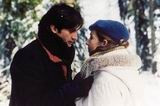A refugee from an unspecified country in Eastern Europe has moved to the West but is plagued by his eventful past and dreams of the ideal relationship. One day he meets the girl of his dreams and, despite all obstacles, refuses to give her up. The Italian director based his story on an autobiographical Hungarian novel, but casting Czech actors in the main roles gives it somewhat different implications. The film was screened in competition at the Berlin IFF in 2002.

Synopsis
Tobias Horvath lives in Switzerland, where he has worked for ten years in a watch factory. He was born in an unspecified village in an unspecified country in Eastern Europe. He grew up in poverty, with no father, and with a mother who occasionally worked as a prostitute. When he finds out one day who his father is, he plunges a knife into his back and, leaving him for dead, runs off. Tobias despises his present life, spent in monotonous work and short-lived love affairs, and he escapes into his literary attempts and dreams of finding true love. One day he meets the woman of his dreams: he has known her since childhood and he also knows that she is the daughter of his father. Today Karolina is married to a lab technician, with whom she moved to Switzerland. Tobias’ and Karolina’s love seems doomed but Tobias has no intention of giving up. This film is based on the novel by Hungarian writer Agota Kristof. The director claimed to have found the ideal person to play Tobias in the Czech puppet-actor Ivan Franěk and cast Czechs in other important roles.
About the film
118 min / Black & white, 35 mm
Director Silvio Soldini
/ Screenplay Doriana Leondeff, Silvio Soldini podle románu/based on the novel by Agota Kristof
/ Dir. of Photography Luca Bigazzi
/ Music Giovanni Venosta
/ Editor Carlotta Cristiani
/ Producer Lionello Cerri, Luigi Musini
/ Production Albachiara SpA
/ Cast Ivan Franěk, Barbara Lukešová, Ctirad Götz, Caroline Baehr, Cécile Pallas, Petr Forman, Zuzana Mauréry, Pavel Anděl, Jitka Ježková, Jaromír Dulava
About the director

Silvio Soldini (b. 1958, Milan) studied film at New York University. In 1982 he returned to work in Milan as a translator and assistant director. He also made short and medium-length films (Paesaggio con figure, 1983, Giulia in ottobre, 1985, La fabbrica sospesa, 1987). In 1984 he established his own production company Monogatari. In 1989 he made his first feature film Joyful Atmosphere of the West (L’aria serena dell Ovest). He received international success with the comedy Bread and Tulips (Pane e tulipani, 2000). Other films (selection): Divided Soul (Un anima divisa in due, 1993, The Acrobat (Le acrobate, 1996), Home, Things, the City (Casa cose citta, 1997, doc.).










